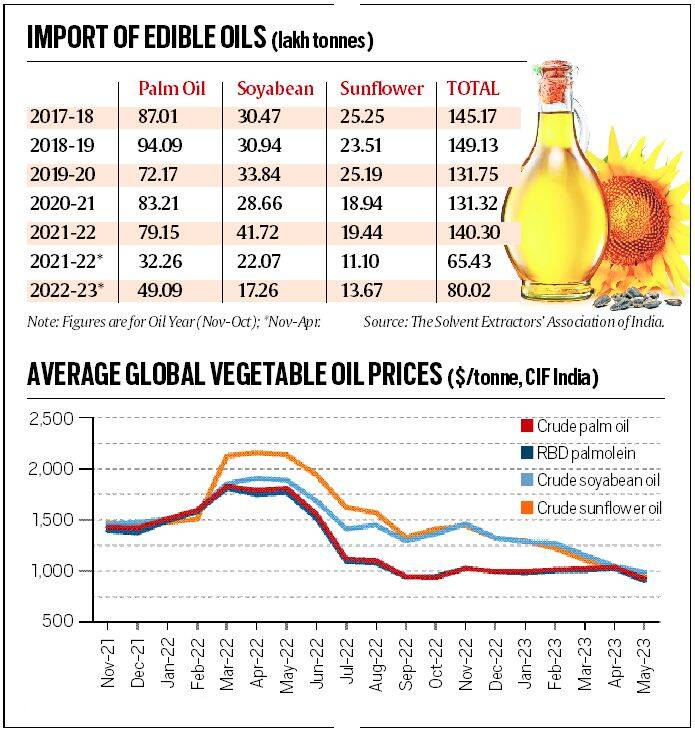Indian Economy
Edible Oil Prices and Significance for India
- 24 May 2023
- 6 min read
For Prelims: Edible Oil, Covid-19, Black Sea, Black Sea Grain Initiative, Mission on Edible Oils-Oil Palm.
For Mains: Edible Oil Prices and Significance for India.
Why in News?
Edible oils have experienced significant Price volatility over the past 2-3 years.
- The global vegetable oils price index of the UN Food and Agriculture Organization experienced a significant drop to 77.8 points (2014-16 base period value = 100) in May 2020 during the peak of global Covid lockdowns. However, it reached an all-time high of 251.8 points in March 2022 following Russia's invasion of Ukraine.
What are the Factors for Volatility in Edible Oil Price?
- The war between Ukraine and Russia disrupted the world's supply of this oilseed, as the Black Sea ports were shut off.
- Ukraine and Russia accounted for nearly 58% of global production in 2021-22, causing prices to skyrocket.
- The situation changed with the Black Sea Grain Initiative agreement between Russia and Ukraine, brokered by the UN and Turkey. The agreement facilitated the safe navigation of vessels carrying grain and foodstuffs from designated Ukrainian ports.
- This led to the shipping out of accumulated sunflower oil, meal, and seed from Ukraine, resulting in international vegetable oil prices falling below pre-war levels.
What does this Translate into for India?
- Reduction in Cost:
- The import of sunflower oil in India has the potential to significantly reduce the price of edible oils in the country. By importing sunflower oil, which has a landed cost of approximately USD 950 per tonne, the overall cost of edible oils in India can be reduced.
- Impact on Consumers:
- When prices soared, many households and institutional consumers such as restaurants and canteens switched from sunflower oil to relatively cheaper alternatives like soybean oil or local oils.
- However, as import flows and price parity have been restored, consumers are returning to sunflower oil.
- Market Expansion:
- Sunflowers are traditionally grown in Karnataka, Telangana, and Maharashtra.
- Roughly 70% of the country’s sunflower oil consumption is in the South, with Maharashtra (10-15%) and other states making up the rest.
- This regional concentration presents a substantial market for sunflower oil products.
- Sunflowers are traditionally grown in Karnataka, Telangana, and Maharashtra.
- Meeting the Demand:
- Over the past decade, domestic production of sunflower oil has declined to insignificant levels. This decline opens up opportunities for imports to meet the growing demand for sunflower oil in the country.
- The decline in domestic production and the preference for sunflower oil in certain regions create potential for increased imports of sunflower oil. Importers and sellers can play a significant role in meeting the market demand for branded sunflower oil.
What is the Scenario of Consumption of Cooking Oil in India?
- India consumes 23.5-24 million tonnes (mt) of cooking oil annually, out of which 13.5-14 mt is imported and the balance 9.5-10 mt produced from domestically cultivated seed.
- Sunflower is the fourth largest consumed oil (2-2.5 mt), behind mustard (3-3.5 mt), soyabean (4.5-5 mt) and palm (8-8.5 mt).
- Both sunflower and palm oil are almost wholly imported, with their domestic production at hardly 50,000 tonnes and 0.3 mt respectively.
- This is unlike mustard and soyabean, where the share of domestic output is close to 100% and 30-32% respectively.
What are the Initiatives Related to Cooking Oil in India?
- The government launched the National Mission on Edible Oils-Oil Palm as a centrally sponsored scheme, being implemented jointly by the central and state governments with a special focus in the northeast region and the Andaman and Nicobar Islands.
- It is proposed to have an additional 6.5 lakh hectares for palm oil by 2025-26.
- In order to improve and systemize the data management system in the vegetable oil sector, the Directorate of Sugar & Vegetable Oils under Department of Food and Public Distribution has developed a web-based platform (evegoils.nic.in) for online submission of inputs by vegetable oil producers on a monthly basis.
- The portal also provides a window for online registration and submission of monthly production returns.
UPSC Civil Services Examination, Previous Year Question (PYQ):
Prelims:
Q. Consider the following statements: (2018)
- The quantity of imported edible oils is more than the domestic production of edible oils in the last five years.
- The Government does not impose any customs duty on all the imported edible oils as a special case.
Which of the statements given above is/are correct?
(a) 1 only
(b) 2 only
(c) Both 1 and 2
(d) Neither 1 nor 2
Ans: (a)







